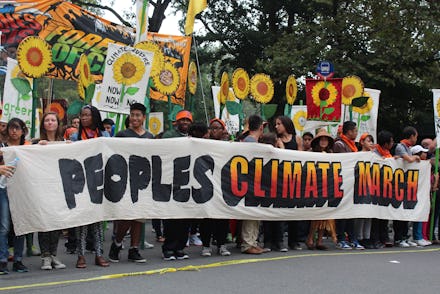31 Powerful Photos Capture the Most Important Message About Climate Change We Need to Hear

An estimated 310,000 people flooded the streets of New York City on Sunday for a single, urgent reason: to show the world that climate change is the crisis — and the cause — that unites us all.
The crowd assembled for the People's Climate March, a global demonstration demanding attention for climate change spanning 162 countries. New York's gathering was by far the largest of the bunch, and the crowd defied generalization. There were activists like Bill McKibben and Naomi Klein; politicians like Al Gore and Dennis Kucinich; celebrities like Leonardo DiCaprio and Mark Ruffalo; even U.N. Secretary-General Ban Ki-moon. There were nonfamous faces, too, like Rutgers University students Sarah Schrading and Deanna Dilandro, both of whom came to protest fracking.
The march's defining feature was right there in the name: It was by the people, for the people. There were babies, dogs, students, immigrants, anarchists, lawyers and artists. "100,000 in the street is 100,000 in the community," Maura Cowley, director of the Energy Action Coalition, told Mic.
The rally's message — that climate change needs immediate attention, and that people everywhere are ready to demand it — was targeted at two groups, she said. The first is corporate interests like the fossil fuel industry, which have a notoriously thorny history of ignoring climate change; the second is elected officials, who hold the power to change policy.
Achieving such a unified message, however, is not easy, particularly when there are 1,572 organizations involved. Samantha Smith, head of the Global Climate and Energy Initiative at WWF International, explained that such unity came with a price for those organizations. "You have to give up your brand," she said. "You have to be unselfish. You have to put the cause ahead of your organizational differences. You have to set aside all the things that divide you, and focus on getting something big like this off the ground."
Among the most fervent hopes on Sunday was that the march would be a launching point — that it would change the conversation in a big way. Climate change, many people told Mic, has moved beyond the confines of traditional activism. It's an issue that truly affects everybody.
Despite the possibility for somberness — climate change isn't exactly a sunny topic, after all — the mood at the march was boisterous and upbeat. Drum lines, costumes and creative signs were the norm. Even the NYPD adopted a relatively mild attitude toward the demonstrators; at one point, one officer was roped into a spirited discussion about ocean cleanup.
Predictably, the celebrity participants drew a big crowd:
But they had some competition from the march's canine representatives:
Though people from all walks of life were marching, young people made up a significant chunk of the turnout. "We're the ones it's going to be affecting," Sarah Schrading, the Rutgers University student, told Mic. "If we're not enthusiastic, nothing is ever going to change."
According to Whit Jones, the campaign director at Energy Action Coalition, the youth bloc had about 50,000 students — 10 city blocks long. The whole march stretched all the way from 86th Street in Manhattan to Columbus Circle, and walked all the way down to to 34th Street.
"What's powerful about this is how people are coming together," said Michael Guerrero, the national coordinator for Climate Justice Alliance. "And that's what it's going to take. It has to be beyond just environmental organizations or climate activists. It has to be everyone."
Given that Sunday brought demonstrations to every continent except Antarctica, it's safe to assume that the world has taken notice. Whether this will translate into real, tangible change is still unclear, but the momentum, at least, is here.
"This is the moment for mass action," Maura Cowley said. "We can't push hard enough."
Correction: Sept. 22, 2014